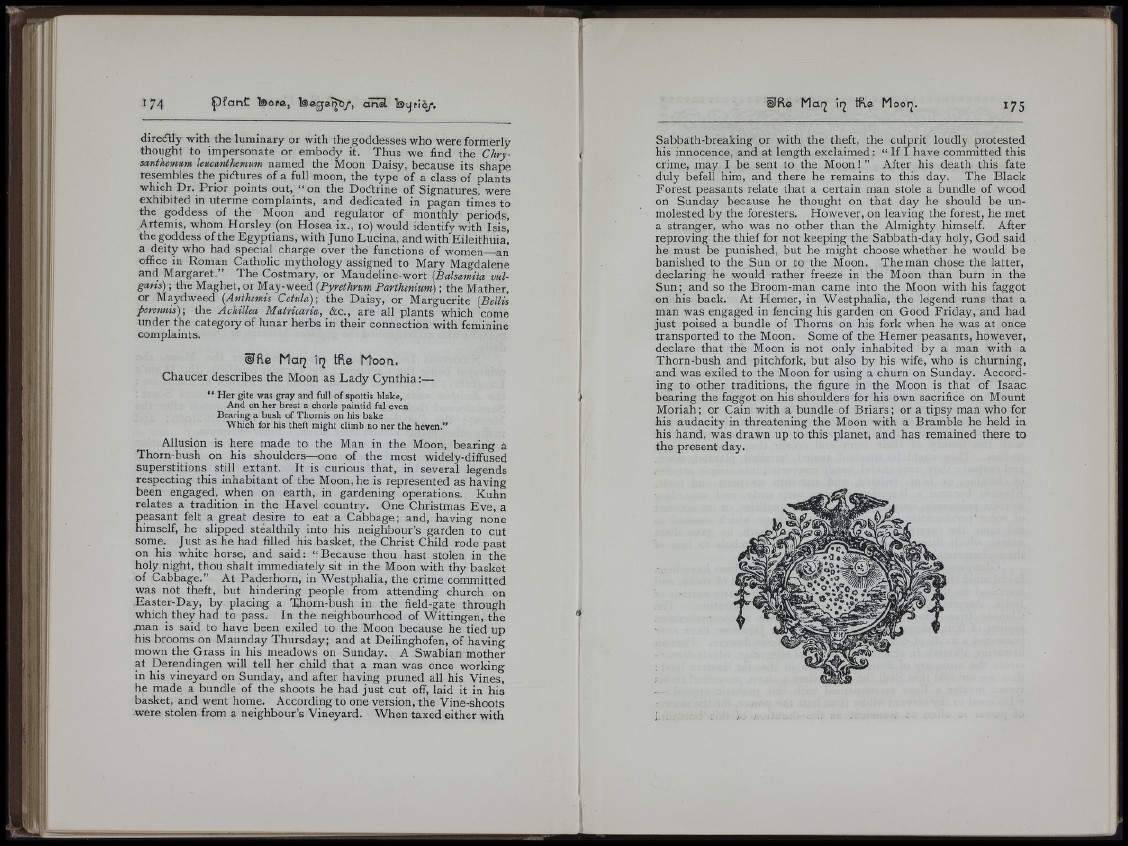
r i
i i
'] I
1■i iI
I '
■r
LM^
direaiy with the luminary or with the goddesses who were formerly
thought to impersonate or embody it. Thus we find the Chrysanthemum
leucanthemum named the Moon Daisy, because its shape
resembles the pidtures of a full moon, the type of a class of plants
which Dr. Prior points out, “ on the Dodtrine of Signatures, were
exhibited in uterine complaints, and dedicated in pagan times to
the goddess of the Moon and regulator of monthly periods,
Artemis, whom Horsley (on Hosea ix., 10) would identify with Isis,
the goddess of the Egyptians, with Juno Lucina, and with Eileithuia,
a deity who had special charge over the functions of women—an
office in Roman Catholic mythology assigned to Mary Magdalene
and Margaret.” The Costmary, or Maudeline-wort [Balsamita vulgaris)
; the Maghet, or May-weed {Pyrethrum Parthenium) ; the Mather,
or Maydweed [Anthemis Cotula); the Daisy, or Marguerite [Beilis
perennis); the Achillea Matricaria, &c., are all plants which come
under the category of lunar herbs in their connection with feminine
complaints.
U fie Maq Iq tRc Moon,
Chaucer describes the Moon as Lady Cynthia
“ Her gite was gray and full of spottis blake,
And on her brest a chorle paintid ful even
Bearing a bush of Thornis on his bake
Which for his theft might climb no ner the heven.”
Allusion is here made to the Man in the Moon, bearing à
T h o rn - Jsh on his shoulders—one of the most widely-diffused
superstitions still extant. It is curious that, in several legends
respecting this inhabitant of the Moon, he is represented as having
been engaged, when on earth, in gardening operations. Kuhn
relates a tradition in the Havel country. One Christmas Eve, a
peasant felt a great desire to eat a Cabbage; and, having none
himself, he slipped stealthily into his neighbour’s garden to cut
some. Just as he had filled his basket, the Christ Child rode past
on his white horse, and said: “ Because thou hast stolen in the
holy night, thou shalt immediately sit in the Moon with thy basket
of Cabbage.” At Paderhorn, in Westphalia, the crime committed
was not theft, but hindering people from attending church on
,Easter-Day, by placing a Idiorn-bush in the field-gate through
which they had to pass. In the neighbourhood of Wittingen, the
jnan is said to have been exiled to the Moon because he tied up
his brooms on Maunday Thursday; and at Deilinghofen, of having
mown the Grass in his meadows on Sunday. A Swabian mother
at Derendingen will tell her child that a man was once working
in his vineyard on Sunday, and after having pruned all his Vines,
he made a bundle of the shoots he had just cut off, laid it in his
basket, and went home. According to one version, the Vine-shoots
were stolen from a neighbour’s Vineyard. When taxed either with
(i
Sabbath-breaking or with the theft, the culprit loudly protested
his innocence, and at length exclaimed: “ I f I have committed this
crime, may I be sent to the Moon ! ” After his death this fate
duly befell him, and there he remains to this day. The Black
Forest peasants relate that a certain man stole a bundle of wood
on Sunday because he thought on that day he should be unmolested
by the foresters. However, on leaving the forest, he met
a stranger, who was no other than the Almighty himself. After
reproving the thief for not keeping the Sabbath-day holy, God said
he must be punished, but he might choose whether he would be
banished to the Sun or to the Moon. The man chose the latter,
declaring he would rather freeze in the Moon than burn in the
Su n ; and so the Broom-man came into the Moon with his faggot
on his back. At Hemer, in Westphalia, the legend runs that a
man was engaged in fencing his garden on Good Friday, and had
just poised a bundle of Thorns on his fork when he was at once
transported to the Moon. Some of the Hemer peasants, however,
declare that the Moon is not only inhabited by a man with a
Thorn-bush and pitchfork, but also by his wife, who is churning,
and was exiled to the Moon for using a churn on Sunday. According
to other traditions, the figure in the Moon is that of Isaac
bearing the faggot on his shoulders for his own sacrifice on Mount
Moriah; or Cain with a bundle of B ria rs ; or a tipsy man who for
his audacity in threatening the Moon with a Bramble he held in
his hand, was drawn up to this planet, and has remained there to
the present day.